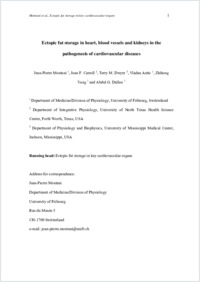Ectopic fat storage in heart, blood vessels and kidneys in the pathogenesis of cardiovascular diseases
- Montani, Jean-Pierre Department of Medicine/Division of Physiology, University of Fribourg, Switzerland
- Carroll, Joan F. Department of Integrative Physiology, University of North Texas Health Science Center, Forth Worth, Texas, USA
- Dwyer, Terry M. Department of Physiology and Biophysics, University of Mississippi Medical Center, Jackson, Mississippi, USA
- Antic, Vladan Department of Medicine/Division of Physiology, University of Fribourg, Switzerland
- Yang, Zhihong Department of Medicine/Division of Physiology, University of Fribourg, Switzerland
- Dulloo, Abdul G. Department of Medicine/Division of Physiology, University of Fribourg, Switzerland
-
2004
Published in:
- International Journal of Obesity. - 2004, vol. 28, no. Suppl 4, p. 58-65
ectopic fat storage
lipotoxicity
perivascular fat
sinus lipomatosis
cardiovascular diseases
hypertension
English
In humans and most animal models, the development of obesity leads not only to increased fat depots in classical adipose tissue locations but also to significant lipid deposits within and around other tissues and organs, a phenomenon known as ectopic fat storage. The purpose of this review is to explore the possible locations of ectopic fat in key target-organs of cardiovascular control (heart, blood vessels and kidneys) and to propose how ectopic fat storage can play a role in the pathogenesis of cardiovascular diseases associated with obesity. In animals fed a high-fat diet, cardiac fat depots within and around the heart impair both systolic and diastolic functions, and may in the long-term promote heart failure. Accumulation of fat around blood vessels (perivascular fat) may affect vascular function in a paracrine manner, as perivascular fat cells secrete vascular relaxing factors, proatherogenic cytokines and smooth muscle cell growth factors. Furthermore, high amounts of perivascular fat could mechanically contribute to the increased vascular stiffness seen in obesity. Finally, accumulation of fat in the renal sinus may limit the outflow of blood and lymph from the kidney, which would alter intrarenal physical forces and promote sodium reabsorption and arterial hypertension. Taken together, ectopic fat storage in key target-organs of cardiovascular control may impair their functions, contributing to the increased prevalence of cardiovascular diseases in obese subjects.
- Faculty
- Faculté des sciences et de médecine
- Department
- Département de Médecine
- Language
-
- English
- Classification
- Medicine
- License
- License undefined
- Identifiers
-
- RERO DOC 4401
- DOI 10.1038/sj.ijo.0802858
- Persistent URL
- https://folia.unifr.ch/unifr/documents/299639
Statistics
Document views: 155
File downloads:
- 1_Montani_efs.pdf: 442
